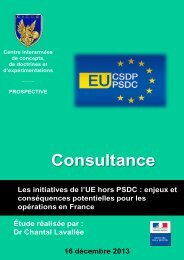Conference
science-research-bulletin-2013-conference
science-research-bulletin-2013-conference
You also want an ePaper? Increase the reach of your titles
YUMPU automatically turns print PDFs into web optimized ePapers that Google loves.
EUROPEAN POLICE SCIENCE AND RESEARCH BULLETIN<br />
SPECIAL CONFERENCE EDITION<br />
POLICING LEGITIMACY<br />
With the original policing idea came a vocabulary<br />
for discussing its legitimacy. Democratic policing<br />
theory has stressed in various ways accountability<br />
to the rule of law and to the people through<br />
political representation as the means to achieve<br />
the appropriate balance of interests in mediating<br />
police legitimacy. Until relatively recently, what<br />
was common to all discussions on the subject of<br />
policing legitimacy was an assumption that the<br />
state was the container within which these issues<br />
were worked out. When police work is carried out<br />
transnationally, relationships to both law and the<br />
political structures of accountability change because<br />
police work overflows the organisational buffers<br />
that modern jurisdictional boundaries traditionally<br />
put up. The legitimacy of modern states depended<br />
in large part on a sense of patria; that is, devotion<br />
to one’s country. When Hume suggested that ‘we<br />
are to look upon the vast apparatus of government<br />
as having ultimately no other object or purpose<br />
but the distribution of justice’, it went without<br />
saying that such distribution happened within a<br />
country and the extent to which a given country<br />
was capable of ‘doing it’ (distributing justice) was<br />
a test of its government’s legitimacy (quoted in<br />
Pagden, 2013, p. 303). The traditional vocabulary<br />
for talking about the legitimacy of democratic<br />
governance (social contract, separation of<br />
powers, rule of law, etc.) has, as its scarcely<br />
spoken assumption, the Weberian state. Under<br />
transnational conditions the notion of a unified<br />
and coordinated ‘state’ successfully maintaining<br />
a monopoly claim on the use of coercive power<br />
in the maintenance of social order on a specified<br />
territory does not seem so tenable (Bayley and<br />
Shearing, 1996). Plenty of effort has been put into<br />
imagining new ways of governing governance<br />
under the mantle of neo-liberalism (eg. Johnson<br />
and Shearing, 2003; Zedner, 2010). Meanwhile,<br />
manifestations of global policing power are largely<br />
justified on functional grounds: because the<br />
global system is plagued with certain problems<br />
(drug or immigrant smuggling, for example, or<br />
sex tourism or cybercrime) there needs to be a<br />
control response. These control responses are<br />
largely symbolic and manifest around a number<br />
of folkdevils and suitable enemies, what Peter Gill<br />
called ‘rounding up the usual suspects’ (2000).<br />
Global governance is multi-leveled and highly<br />
complex leaving significant feelings of anomie,<br />
conflict and dislocation (Bauman, 2006) making<br />
the functional-mission rhetoric of global policing all<br />
the more crucial to its legitimation. Functionalism<br />
is accompanied by claims of a technical scientific<br />
nature concerning ‘what works’ in policing.<br />
Proponents of the new ‘crime science’ (Smith and<br />
Tilly, 2005), ‘experimental criminology’ (Sherman,<br />
2009), and ‘intelligence-led policing’ (Ratcliffe<br />
2004) offer a few examples of how expert claims<br />
about policing are being made along technoscientific<br />
lines. Functional-mission and scientific<br />
rhetoric constitute the main basis of policing<br />
legitimacy under transnational conditions. Police<br />
science in the 21st century aims to separate<br />
the risky from the at-risk, the threatening from<br />
the threatened and the undeserving from the<br />
deserving. Instead of legitimating policing within<br />
a language concerned with the social contract<br />
and the other concerns with early state theorists,<br />
global policing is legitimated on the functional<br />
assumption that strong ‘law enforcement’ (ie.<br />
policing in its negative sense) can keep the suitable<br />
enemies in their place because it is scientific.<br />
Legitimating policing this way pretends to the<br />
truth that humankind can be defined in black and<br />
white terms.<br />
TYPOLOGY OF THE POLICING<br />
FIELD<br />
The policing field is crowded with security actors<br />
(Dupont, 2007). The architecture of global<br />
policing has been described in hierarchical terms<br />
(Bowling and Sheptycki, 2012, p. 25). According<br />
to this view, there are several tiers to global<br />
policing. At the global level are such institutional<br />
players as Interpol, the World Customs Council<br />
and the United Nations Police. At the regional<br />
level are different transnational police networks,<br />
for example ASEANAPOL in South East Asia and<br />
Europol in the European Union. Then there are<br />
national level agencies, the German BKA and<br />
the Australian Federal Police for example, and<br />
municipal policing agencies, for example the<br />
London Metropolitan Police. This tiered structure<br />
seems logical but it is inaccurate and incomplete<br />
in some respects. Firstly, since it is recognised that<br />
policing may be undertaken under either private<br />
or public auspices, and sometimes as a hybrid,<br />
any understanding of the architectural hierarchy<br />
of global policing cannot be restricted to state<br />
agencies (Zedner, 2006). Even if we could build<br />
a picture of the pyramid of global policing that<br />
encompassed both private and public based<br />
security providers there is still a difficulty with this<br />
view. At the supposed ‘bottom of the hierarchy’,<br />
where policing actually takes place, that is to say<br />
13





